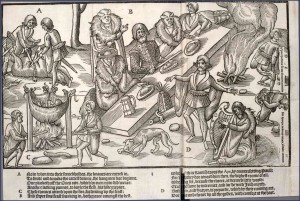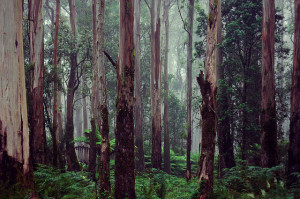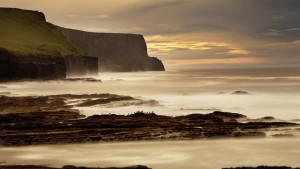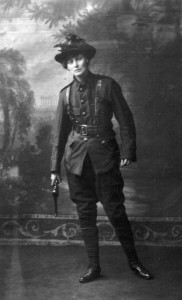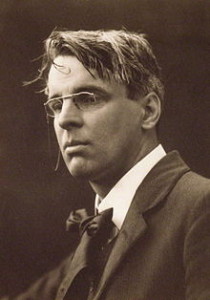In John Derrick’s Image of Irelande, a series of wood carvings and respective captions portray the Irish in a negative light, on the basis of culturally different borders and boundaries. In the caption for the third wood carving of the series, Derrick writes about the Irish “lacking pans, to boil the flesh, his hide prepare,” indicating some sense of distaste in their lack of cookware to separate the meat from the fire. Moreover, the wood carving attached to the caption presents a picture of the Irish people eating on the floor, which further depicts them as what the English would perceive as “uncivilized” behavior at the time.
In View of the Present State of Ireland, Edmund Spenser demoted other aspects of the Irish way of life, claiming that “the people that live…in the woods…grow thereby more barbarous, and live more licentiously than they would in towns…for there they think themselves half exempted from law and obedience.” Here, Spenser is drawing a dividing line between what he perceives to be two separate physical spaces, nature and civilization; in doing so, he ultimately uses that border as a way of determining the behavioral characteristics of those on either side of the line.
While Spenser and other had often vilified the Irish for not respecting the physical and cultural boundary between nature and civilization, Irish poet W.B. Yeats chose to portray that quality in a positive light. In his poem “Who Goes with Fergus,” Yeats poses the question to Irish readers, “Who will go with Fergus now, / And pierce the deep wood’s woven shade, / And dance upon the level shore?” Here, Yeats refers to Fergus as dancing upon the “level shore,” a liminal space that is literally on the boundary between two different regions. Fergus is dancing, suggesting a kind of romantic freedom in ignoring physical and cultural demarcations.
Likewise, Yeats’ poem “The Song of Wandering Aengus” also works to glorify the fluidity of borders and boundaries. In the heart of nature, the speaker states “When I had laid it on the floor, I went to blow the fire aflame.” In direct contrast to Derrick’s negative representation of the Irish people eating on the floor, Yeats depicts the act in a romantic light. In the middle of the poem, the “glimmering girl, with apple blossom in her hair,” also symbolizes the balance between nature and humanity. Like Fergus, the girl celebrates this balance by wearing a crown of flowers in her hair.
It is clear that Yeats was quick to romanticize the act of breaking down borders and boundaries, but not in every case. During his era, some women were in the process of challenging social conventions and becoming more involved in politics; it became apparent, however, that Yeats did not support that kind of behavior. Yeats’ poem “Easter 1916” reflects this mentality. In it he writes, in reference to the female revolutionary nationalist Constance Markievicz, “That women’s days were spent / In ignorant good-will, / Her nights in argument / Until her voice grew shrill.”. In contrast to the “glimmering girl” from “The Song of Wandering Aengus,” the woman in this poem presents a kind of idealized beauty that has since been ruined and corrupted by what Yeats clearly considers to be a field for men.
In the final lines of the poem, Yeats redeems the men described in the beginning lines by immortalizing their last names in verse. While this naming process honors the memories of MacDonagh, MacBride, Connolly and Pearse, Constance Markievicz receives no such redemption. At the end of the poem, she is still the nameless figure who spent her days “in ignorant good-will.” While Yeats liked the concept of breaking down boundaries in theory, he was clearly threatened by women who did so. Ultimately, in this poem and many others, Yeats is not celebrating the act of breaking down cultural boundaries, but rather drawing his own demarcations based on his individual perspectives.
Works Cited
Edmund Spenser. View of the Present State of Ireland.
John Derrick. Image of Irelande.
William Butler Yeats. “Who Goes with Fergus.” Collected Poems of W.B. Yeats. Scribner, 2008. Kindle.
William Butler Yeats. “The Song of Wandering Aengus.” Collected Poems of W.B. Yeats. Scribner, 2008. Kindle.
William Butler Yeats. “Easter 1916.” Collected Poems of W.B. Yeats. Scribner, 2008. Kindle.

